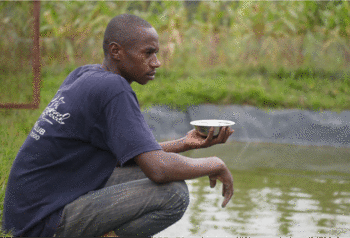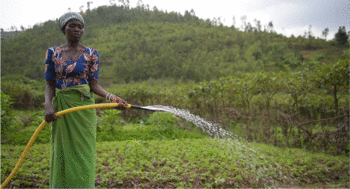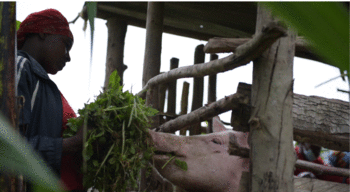Stories from the field: Harnessing source of life in Rwanda
FAO’s Knowing Water Better - towards fairer and more sustainable access to natural resources (KnoWat) project worked to improve local water resource management solutions in Yanze, Rwanda.
The Yanze catchment is located close to Kigali, capital of Rwanda. The scenery is mountainous, as can be expected in the ‘Land of a Thousand Hills’. Cultivation on terraces shape the hillsides like big stairs, with small farms every here and there.
A 31-year-old farmer Marcel Munyawera sits next to a fishpond in Yanze and frowns, when he tells how the situation was before FAO supported the construction of water harvesting dams, which now also work as fishponds, to the area.
“Before the project (a FAO project in the area before the KnoWat project) provided the dams, we used to have conflicts due to water scarcity. Everyone was fighting for the wetland,” he tells with a serious face.
The Yanze catchment is a source of life for its over 68 100 inhabitants: the water from the catchment is used for drinking, cooking and bathing, and for agriculture. Most of its rural population are vegetable farmers, and around 40 percent are considered as poor. Without water, crops do not grow, there is nothing to sell and families cannot afford food.
Due to its proximity with the capital, a greater part of water used in Kigali City is abstracted directly from the Yanze River. The capital’s population is growing and the city uses more water, reducing the water available for farmers in the catchment.
Sustainable solutions
From 2019 to 2022, the KnoWat project worked together with Action for Environment Protection and Promotion of Agricultural Sector (APEFA) to tackle water scarcity and improve local water management solutions in the Yanze catchment. The six dams acquired from FAO were used to collect water for irrigating vegetables in the area, but the farmers found it difficult to irrigate the fields adequately using watering cans and treadle pumps, thus limiting their production.
The KnoWat project leveraged on the FAO’s previous support and improved the irrigation system by distributing three solar-powered irrigation pumps to the local vegetable producing cooperative (Yanze Horticulture Promotion Cooperative, YAHOPROC), which has 245 members.
“We no longer sit idly during the sunny season, worrying about how we can irrigate. There is no such problem now, we have water and a machine which automatically pumps it for us," tells Jean d’Arc Mubaranyanga, a broccoli farmer and a member of YAHOPROC. She is watering a farmland with one of the new light solar irrigation pumps.
With the previous equipment, irrigation was too physical, especially for some women. Today, thanks to the new solar pumps, farmers can cultivate all year round and have higher yields. “Before, I could barely harvest 60 kilograms of broccoli per season on two acres. Since I started using this solar-powered pump, I easily harvest 200 kilograms,” Jean d’Arc describes the results.
The increased yields have generated more income too. Jean d’Arc looks positively toward her future. “Before getting this technology and have increased yield, I didn’t have a bank account and I had no idea of where banks were. Now, I have an account, I save and have money to buy an asset for my development so I will have a better life when I am old and unable to work.”
Even farmers’ diets have improved. We could not eat vegetables before, now our nutrition is improved. We no longer have malnutrition issues. Children don’t suffer from Kuashiorkor (severe malnutrition),” she adds.
Another project innovation concentrated on two strategies to diversify income, by supplying 30 pigs and 5 000 fingerlings to stock in three dams. The cooperative has now raised around 300 pigs and farmers’ income has increased from selling both fish and pigs.
“One year after I received the pig, I have earned 150 000 RF (USD 150). I managed to pay the school fees of my child, I was able to cover other basic needs and my house has solar electricity, with manure I harvest more vegetables. Life is good,” Louise Mukatumusenge, a farmer, describes her life now.
To ensure the sustainable use of water, more than 700 farmers in Yanze were trained to sustainably use the available water.
Safeguarding water rights for future
However, as the effects of climate change and population growth are expected to increase, so will the competition on water. How to make sure the water in Yanze will be allocated in an equitable manner for all users?
These types of policy-decisions, plans and investments can be made only if we know, how people, communities and organizations gain access to, and use water resources, how much of the water can be used, for how long, for what purpose and under what conditions. In short: we need to know the water tenure.
The KnoWat project launched a pioneering water tenure assessment in Yanze to identify and analyse the different water tenure arrangements in the country, working closely with YAHOPROC and its members.
“One of the key findings in Yanze was that the vegetable farmers use the water resources in an informal way and are not always aware of its legal requirements. If the water is used for small scale irrigation activities, you don’t need a permit for that. However, as the farmers use water from the dams, they should be under the permit regime. For example, what would happen if the city of Kigali requires so much water that there is not enough for the small farmers in Yanze?,” explains the KnoWat project’s National Coordinator, Joseph Bizima.
The overall findings and recommendations of the assessment which address key water resources management issues (in Yanze and another pilot location) were presented and validated in March 2022. Different key stakeholders participated in the water tenure validation workshop including the Rwanda Water Resources Board, Rwanda Agriculture and Animal Resources Board, Water and Sanitation Corporation, representatives of the local authorities, water engineers, and other actors in the water sector. International experts of FAO also participated in the event virtually.
The recommendations of the assessment include a water fee structure based on water use category so that high impact users pay according to use levels, and awareness campaigns and capacity building to raise water users’ understanding of existing legal requirements governing land and water resources.
Bernard Musana, Head of Knowledge and Forecasting Hub Department at Rwanda Water Resources Board, welcomed the water tenure assessment report and commended the work done by FAO under the KnoWat project. The project already took action and worked with the YAHOPROC cooperative and local leaders to build their capacity to establish a water users’ association in the Yanze catchment.
“Through the association, farmers will be able to obtain a water permit, providing long-term secure access to water resources to sustain their production systems”, Bizima continues. But naturally the project team hopes that the recommendations would inspire action on other levels too. Because to combat water scarcity, concerted actions are needed at local, regional, national and international levels.
“Through our KnoWat project in Rwanda, Senegal and Sri Lanka, we have aimed to improve water governance processes with different activities, put the topic of water tenure on to political agendas and acknowledge it as a crucial element of development. Besides the three countries, we have wanted to contribute to the global work and discourse on water tenure”, tells Benjamin Kiersch, Global Coordinator of the project. Secure water tenure rights, especially for rural people living in water scarce areas, are essential for food security – and basically for inclusive and just development” summarizes Kiersch.
Meanwhile in Yanze, the river flows forward, as well as the people in the catchment, thanks to the new water solutions.



